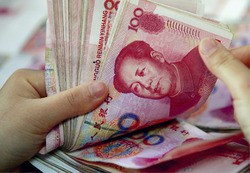Voluntarily Loved
Charles Wyplosz
You can ask whether the dollar will remain trustworthy but, so far, it is. There is no financial market in the world that can match the U.S. in terms of size and effectiveness. And I do believe that the U.S. dollar will remain the main global currency in the foreseeable future. Which currency can challenge the domination of the U.S. and the greenback?
The alternative might be a global currency. I believe that one day there will be a world currency, but even if you are a young man you are not going to see it. There is one country that is a potential challenger down the road: China. When the GDP per capita in China becomes similar to what it is in the West, it will be the biggest economy in the world, and its currency – the renminbi – has the potential to become a global currency.
The Chinese are still in the state planning frame of mind when they attempt to force people to hold and trade in the renminbi. If you want to do business with China these days, you have to settle in their currency, even though you might not want to. I believe that, in forcing people to use the renminbi, China is going in exactly the wrong direction. The Chinese have a long, long, way to go to understand that a currency becomes international because people love it, not because they are forced to hold it. At least, personally, I am not a believer in forced love
But, for that to happen, several conditions must be met beforehand. Firstly, a global currency must be a trustworthy currency, which means a low-inflation currency. But China doesn’t have low inflation, and seems unable to operate at regularly low inflation rates.
Secondly, to be an issuer of a global currency, you need a true financial system in the background, with an appropriate banking system in particular. Beijing, however, doesn’t have one yet. The Chinese banks are very big but they are state-owned. This is a problem. Why? Because everywhere in history, if you look at how state banks behave, you see they don’t behave well. The 2008 crisis in the United States occurred because the large U.S. banks believed that they would be bailed out by the taxpayers if they failed. What do you think the large Chinese banks believe? They are a part of the government, so they cannot go bankrupt. Thus they can make many, many mistakes.
In addition, China does not have a world-class financial market. There is one in Shanghai, but it is still a local market; it is not a global market in any way.
And finally, China still imposes widespread capital controls. As long as you cannot bring money in and out freely, the renminbi cannot be an international currency. Only once the Chinese remove capital controls, once they allow the emergence of a truly private banking system that is well regulated and supervised, and once their capital market becomes globally integrated, will the renminbi get the chance to become a global currency.
But does Beijing really want the renminbi to fly globally? My answer is definitely yes. The Chinese see themselves as the next world power, so they want all the status symbols that go with that – be it a huge navy, a manned space program, or an international currency.
The government has a lot of work to do to realize this dream, and actually they have already started. They have explicitly adopted the objective of ‘internationalizing’ the renminbi. They have developed procedures to increase the amount of trade conducted in the currency. So yes, it is happening, but it is happening on a very small scale. And, importantly, it is not happening completely voluntarily.
That makes for a big difference between the U.S. dollar and the renminbi. You see, people hold dollars not because they are forced to hold dollars by the U.S. government, but because they want to hold dollars. In contrast, the Chinese are still in the state planning frame of mind when they attempt to force people to hold and trade in the renminbi. If you want to do business with China these days, you have to settle in their currency, even though you might not want to. I believe that, in forcing people to use the renminbi, China is going in exactly the wrong direction. The Chinese have a long, long, way to go to understand that a currency becomes international because people love it, not because they are forced to hold it. At least, personally, I am not a believer in forced love.












